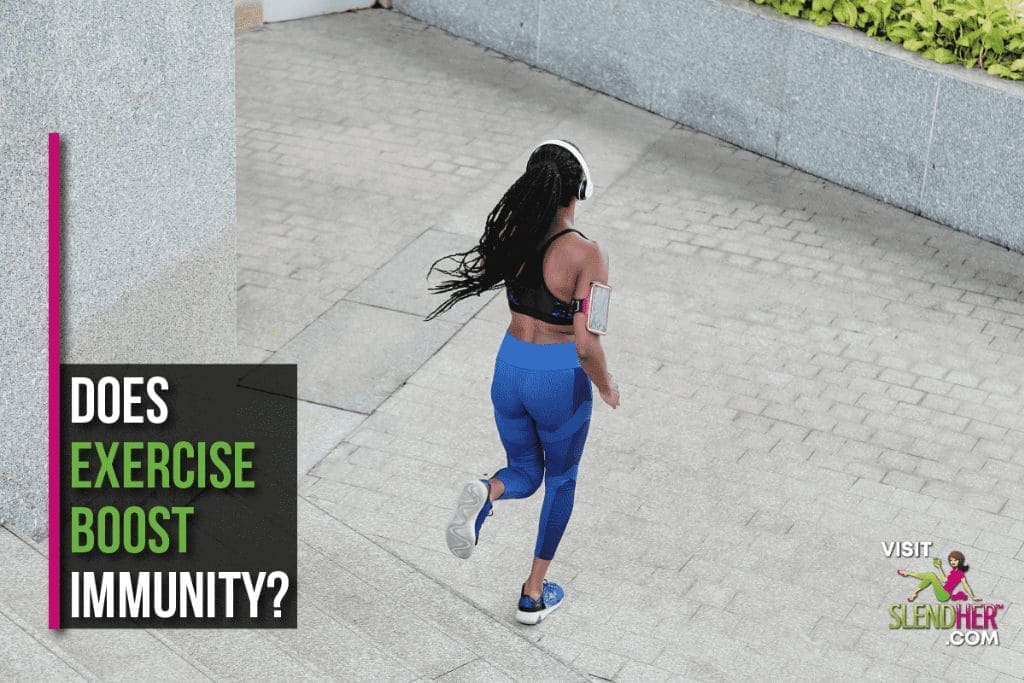
You get plenty of sleep and eat a healthy, plant-based diet full of vitamin C. When you hear the words “cold season,” you say, “bring it on.” More or less, you feel ready to combat all those viruses that start circulating this time of year.
Still, there are so darned many garden-variety germs out there as well as the more serious and infamous COVID-19. So, you wonder: “Is there anything else I can do to make it through cold, flu, and COVID season without spending too much time laid up on the couch?”

Well, my friends, the answer is “yes!”
Because research shows that regular moderate exercise can boost immunity. More specifically, exercise reduces inflammation, minimizes your risk of falling ill, and heightens your overall immune response. In addition, at least one study suggests that adequate intensity exercise can help prepare the immune system to fight off COVID-19.
Essentially, exercise strengthens and regulates the immune system.

How exactly does regular exercise help boost immunity?
We each have a limited number of white blood cells or immune cells in our bodies that usually hang out in tissues and certain organs such as the spleen. They sort of lie in wait ready to pounce on invaders that may pass by.
But during and immediately after exercise, the amount of white blood cells and anti-inflammatory agents increase within our blood and lymph and then circulate more freely throughout our bodies. When out and about, they’re more likely to encounter those unwanted visitors better known as germs. And they work in tandem to seek out and destroy viruses, thereby lowering our chances of getting sick. But even if we do get sick, we likely won’t experience severe symptoms.
What types of exercise boost immunity?
Granted, the word “exercise” refers to all kinds of planned physical activity. So, you might be wondering if one type of exercise boosts immunity any more than another?
Again, the answer is “yes!”
To date, most research has looked at the effects of moderate to vigorous aerobic exercise with a duration of less than one hour. This type of exercise could include running, walking, biking, or swimming, for example.
More specifically, one study found that daily, 30- to 60- minute fast-paced walks build immunity. Another concluded that brisk, 30-minute walks can elevate white blood cell count.

Other forms of exercise such as strength training, resistance training, and high-intensity internal training (HIIT) likely have a positive impact on immunity as well. But there is less research currently available to support these claims.
What intensity of exercise boosts immunity?
Everything in moderation, right? I know you’ve heard that one before.
More intense and longer durations of exercise do not boost immunity more than the average-length, moderate workout.
In fact, extended periods of extreme exercise can lower your immunity. That’s because the body interprets intense exercise, such as training for a marathon, as a form of stress. So, after this kind of workout, the body’s immunity decreases as stress hormones increase. And with lowered immunity, you have a greater chance of contracting a virus.
But most of us don’t train for marathons. So, for us regular joes, how much exercise is considered too much? Well, one researcher says workouts should not exceed 90 minutes or include extended periods of high-intensity exercise. Rest days are also important when it comes to boosting immunity.
So, when it comes to exercise that boosts immunity, less really is more. And unless you just can’t get enough of the gym, you’re likely happy to hear that.
In sum
Good news! There’s one more step you can take to increase your odds of fighting off viruses as we enter cold and flu season. Exercise has the ability to boost immunity. But don’t overdo it. Moderate length and intensity aerobic workouts are best for helping our bodies fight off disease. With that said, I’m feeling ready for a brisk, 30-minute walk.
Stay well, friends.
Leave a Reply